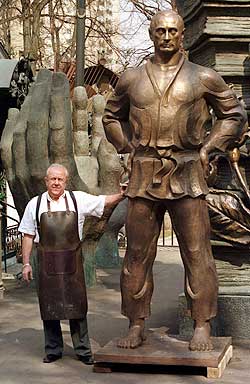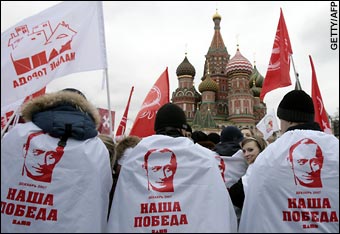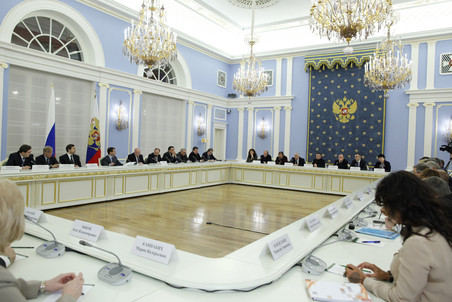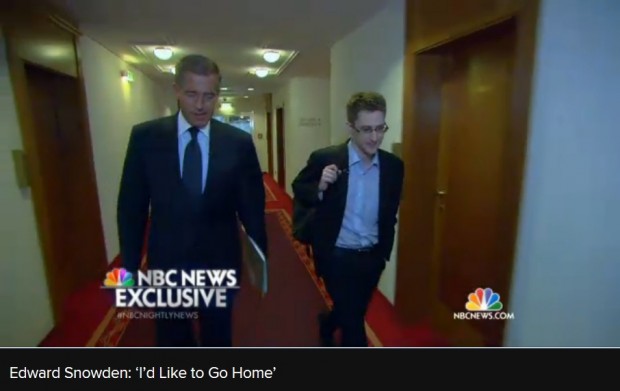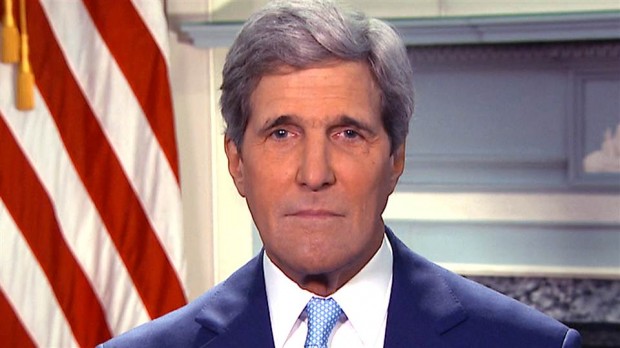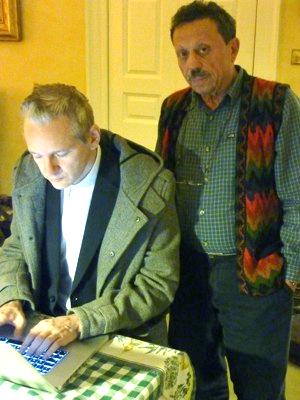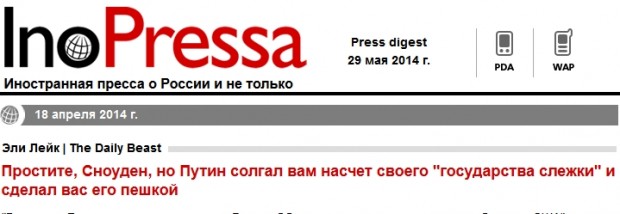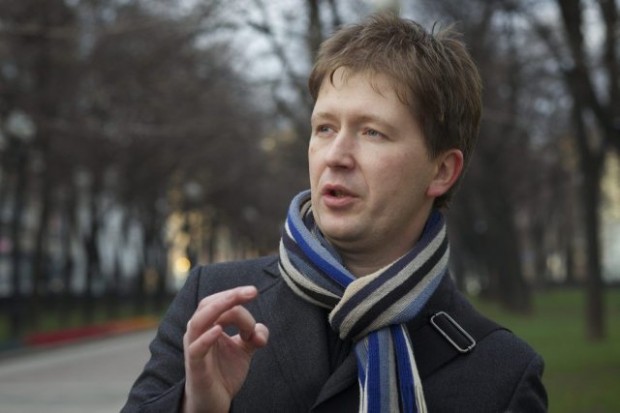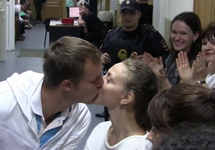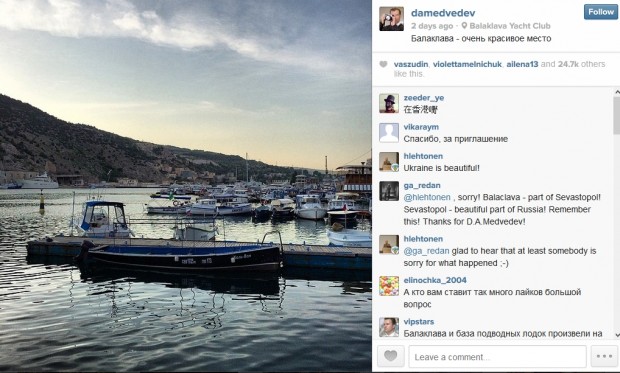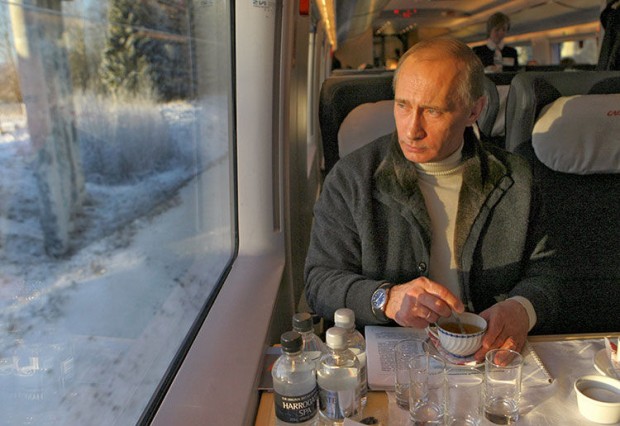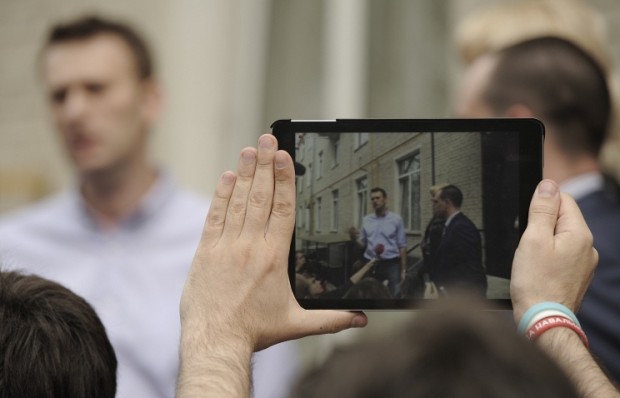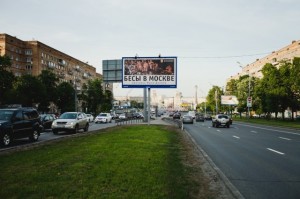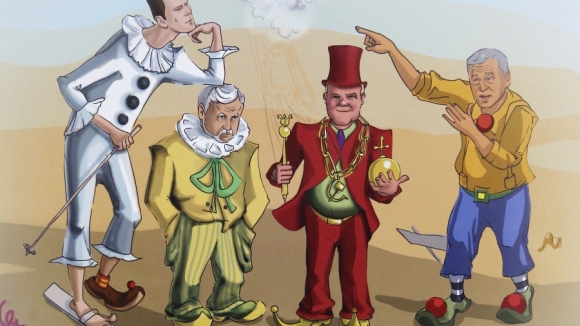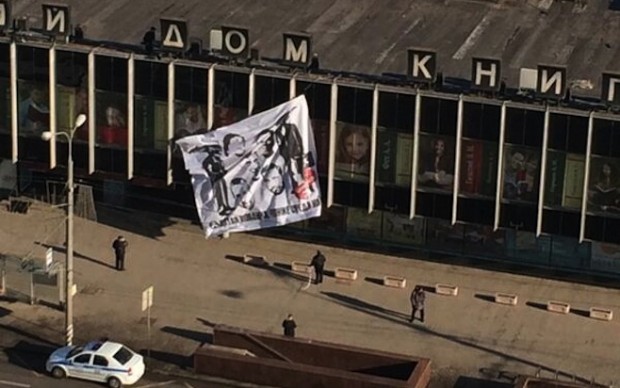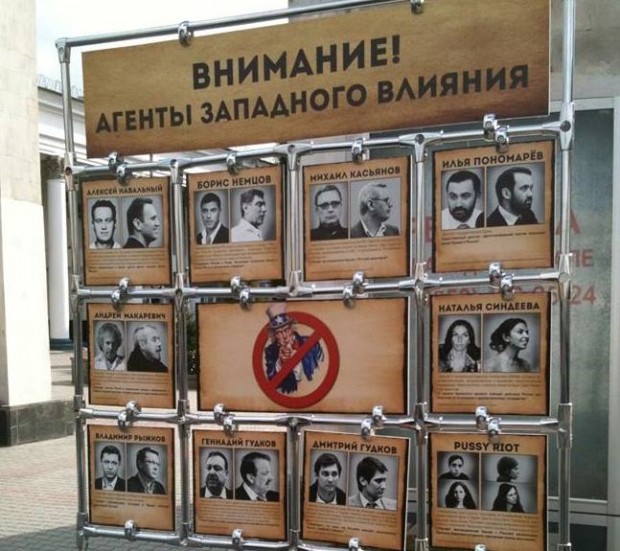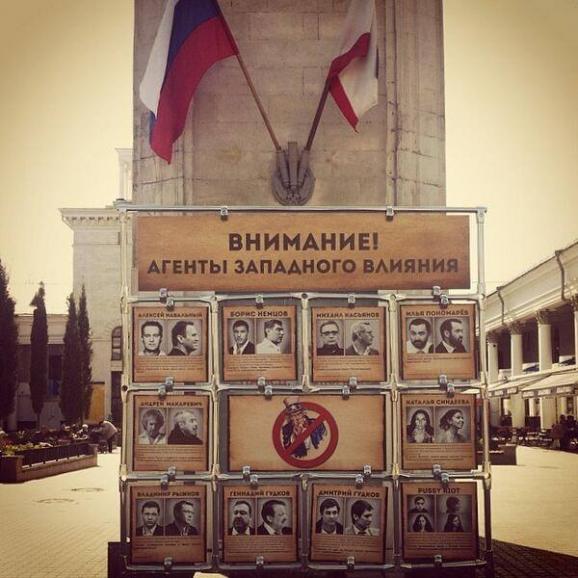Updated Daily. A critical review of Glenn Greenwald’s book No Place to Hide by noted Russian intelligence and cybersecurity expert Andrei Soldatov reveals how little is known about Snowden in Russia. Another NGO has lost its court case attempting to challenge the prosecutor’s designation of “foreign agent,” even as the Russian Constitutional Court ruled that a gender studies center was exempt because scholarly work was excluded from the definition. Former Central Bank official and Kremlin critic economist Sergei Aleksashenko says Western sanctions aren’t having much effect — and that’s deliberate. Authorities are threatening Navalny with jail, claiming he has violated the terms of his house arrest by using the Internet. A billboard campaign depicting the Russian opposition as naked “possessed” people has appeared this month in Moscow, matching caricatures and wild “exposes” in state media and on posters and banners in public places.
For last week’s issue on the killing of Andrei Mironov, the Russian translator and Italian journalist Andreas Rocchelli in Ukraine; Memorial Human Rights Center’s court case challenging the prosecutor’s designation of “foreign agent”; the Chinese-Russian gas deal; debate on journalists embedding with insurgents following capture and release of LifeNews reporters; and Russian liberals’ concern about blow-back to Russia itself of Putin’s aggressive nationalism, go here.
For the previous week’s issue on riots outside Moscow as soccer fans enraged at the murder of a Russian lash out at migrants; threats to block Twitter on the Russian Internet; increasingly aggressive state propaganda against foreigners and dissidents; the pitfalls of measuring public opinion of people dependent on state TV, go here.
Please help The Interpreter to continue providing this valuable information service by making a donation towards our costs.
May 29, 2014
0918 GMT: In an article yesterday titled “Twisted Chamber,” Gazeta.ru described a brewing scandal over the annual elections to the Civic Chamber, a government-controlled body that is supposed to represent Russian civil society and which occasionally meets with President Vladimir Putin to discuss various current topics.
Amid reports of vote-tampering, the opposition is threatening to hold a press conference and reveal all the information about fraud unless there is an immediate re-vote online.
Gazeta.ru even found ads running in a local paper in St. Petersburg advertising pick-ups at metro stops and buses to Rostelkom for the voting procedure. A correspondent answered an ad and was promptly offered 400 rubles to vote for Putin’s court sculptor Zurab Tsereteli. Tsereteli’s office had no comment, said gazeta.ru
Meanwhile, Alexey Navalny and some other prominent opposition leaders, including Girgory Melkonyants, co-chairman of Golos, the suspended vote monitoring organization, Yelena Lukyanova, Mikhail Khodorkovsky’s lawyer, and Boris Altshuler, the children’s rights advocate and others in the parliamentary opposition decided to take part in the elections. With mention of them on Navalny’s very popular blog, despite efforts by authorities to deter Navalny’s colleagues from continuing to post while he is under house arrest and banned from the Internet, they were able to garner a lot of votes for their candidacy.
But then they began to discover that their vote numbers suddenly fell in half, and pro-government figures were suddenly getting a lot of votes. Now Kristina Potupchik, the secretary of a government-created youth movement called Nashi was ahead, along with Dmitry Chugunov, head of StopKham, another pro-government group.
Valery Fedotov, a former United Russia party member from St. Petersburg who went over to Civic Platform, an opposition party, said the opposition may be at the point of boycotting the Civic Forum vote. The informal group of opposition leaders sent a complaint to Vyacheslav Volodin, head of the presidential administration, and the Civic Forum leadersihp
It’s hard for outsiders to understand this entity, which seems so patently co-opted, or fathom why independent figures would want to come anywhere near it. But since it does represent at least one avenue of access to the all-powerful Kremlin, Russians bother with it.
Unfortunately, “reforms” in the body in recent years under the guise of giving it more “democracy” in fact have led to the current problems. Before, the president used to appoint persons of good reputation and leadership in the community, and to have credibility, both Putin and Medvedev would pick people that were more or less recognized as public figures — although the spectrum from outright coopted courtier to migrant rights’ advocate was evident. They in turn would pick others. Some people complained that there were both too many Nashi as well as too many elite human rights types in the group.
So Putin changed to a “voting” system on the Internet, where supposedly “the people” would decide — but like all things related to online voting, it was gamed or hacked and worse, recently some organizations have been found to bus supporters to Rostelkom, the state telecom company where people can make their electronic vote online, and get paid for their troubles.
While this doesn’t seem to trouble the Russians as much, the allotment of blocs of professions or affinity groups in curias, a decidedly corporativist plan — and in the Russian historical tradition a conservative rather than liberal version of this classic social organization idea — means that certain entities with “administrative resources,” i.e. close to the government, can turn out voters. Under the corporativist idea, there are 83 candidates to be delegated by region in the Russian Federation, and 40 confirmed by the president — obviously he is frontloading his own co-opted group. The remaining 43 are for the “popular” vote but these have to be divided up by functions like “teachers” or “writers” or “scientists”.
Melkonyants noted that certain pro-government figures all seemed to rise to the top of the list, which couldn’t be explained by a mere viral video on their point, he said.
Says gazeta.ru:
“Just like Open Government [another state program], Civic Chamber does not possess real influence in the system of state power and fulfills more consultative functions. Nevertheless, the elections have provoked quite a bit of agitation. For 53 ‘Internet places’ there are 262 candidates running. From their appointment there will be a troika of leaders in each nomination category plus one more candidate selected from the highest result.”
In order to vote, people must register an account at a web site called Gosuslugi [Government Services] and obtain a password from Rostelekom.
If this sounds cumbersome and strange — it is.
To be sure, two candidates have been dismissed, one for vote-buying and the other for using his job’s “administrative resources” to collect votes. But the opposition members believe there are more, and point to buses that keep coming to Rostelekom full of voters. In one case, a student complained that she was being asked by the school administrators to vote for a certain candidate. But when asked to file a formal statement under her name, she withdrew, saying “my diploma is more dear to me.”
Why would Kremlin apparatchiks try to crush the vote in a body that is toothless and coopted anyway? Participants believe that Putin doesn’t want people to get the idea that taking part in elections — and doing well, as Navalny did, getting 30% in the mayor election — is a path to recognition in civil society. Instead, the old Soviet (and tsarist Russian) notion of professional castes with privileged positions in society — as long as they are loyal to the state — must prevail. This is among the reasons civil society has such a hard time developing in Russia.
May 29, 2014
0918 GMT: In the US, we’ve had saturation coverage of fugitive former NSA hacker Snowden, generally sympathetic, and social media was awash last night with discussion of an exclusive interview with Snowden in Moscow by NBC’s Brian Williams.
There wasn’t any hard news that came out of the excerpts from the 6 hours Williams spent in Moscow interviewing Snowden; see Bob Cesca’s account for the odd and contradictory things Snowden said.
Most of the lovingly massaged segments with Snowden reiterate themes we’ve already heard repeatedly from both him and his acolytes for a year — that he wants to return to the US, but only if granted clemency; that he was “forced” to flee to Russia because the US pulled his passport; that he believes he is a “whistleblower” and not a felon; and that he thinks he has not helped Russian intelligence at all. Repetition and elaboration of these points has not made them more persuasive in the absence of any hard questions about his timeline and associations.
Secretary of State John Kerry refuted Snowden’s claims on NBC:
“Earlier in the day, Secretary of State John Kerry described at least one of Snowden’s answers to Williams as “pretty dumb.” He called Snowden a coward and traitor, far from Snowden’s classification of himself as a patriot.
Snowden said in the interview that he would rather return home than be anywhere else in the world. Kerry, clearly agitated, said the United States would be happy to put him on a plane — to face justice.
‘We’d be delighted for him to come back. He should come back. That’s what a patriot would do,” Kerry said on TODAY. “A patriot would not run away and look for refuge in Russia or Cuba or some other country. A patriot would stand up in the United States and make his case to the American people.'”
A critical book review of Glenn Greenwald’s book No Place to Hide by Michael Kinsley sparked a denunciation by the New York Times‘ own ombudsperson Margaret Sullivan, then counter-arguments by the review editor and Kinsley himself. NBC’s straw poll on Twitter with the hash tags #traitor or #patriot were about evenly divided – 53% and 47%.
0900 GMT: In Russia, by contrast with the West, there actually hasn’t been much published or broadcast about Snowden. After a flurry of news coverage when he first revealed his identity, and then came to Moscow and held a meeting in the Moscow airport with human rights advocates, other than some propaganda pieces by WikiLeaks collaborators like the notorious provocateur and antisemite Israel Shamir , there hasn’t been much in the Russian media at all.
To be sure, there have been a few items like a translation into Russian of of Eli Lake’s article in the Daily Beast or other translations of US news stories.
And of course — after a year of virtually no fresh pictures of him at all in the Russian media — there was Snowden’s much-publicized pre-rehearsed videotaped question for President Putin, where he pitched some softballs and embarrassed even his own supporters.
Generally, Russian intellectuals even critical of Putin are supportive of Snowden and it has even been a vehicle for some to articulate their identity in opposition to America at a time of state paranoia about “foreign agents.”
But in the last year, no independent and critical Russian journalist has been allowed to see and interview Snowden (for that matter, neither has any critical American or European reporter — all those admitted to the inner sanctum are first vetted for ideological conformity). In fact, as counterintuitive as it may seem, there haven’t even been interviews with Snowden by the controlled state media. The Kremlin propaganda machine focuses on Snowden and his issues and those of other hackers in jail (whom they convert into heroes and martyrs), but that’s for export, in English. Inside Russia, the topic isn’t much touched, because it would instantly convert into a discussion of what Russian intelligence does to invade its own citizens’ privacy.
In the context of a general news blackout on Snowden in Russia, a major critical review in Russian of Greenwald’s book by Andrei Soldatov breaks a certain wall of silence around Snowden. Soldatov is a noted expert on Russian intelligence, editor of the site agentura.ru, and co-author with Irina Borogan of The New Nobility: The Restoration of Russia’s Security State and the Enduing Legacy of the KGB, who has written a few articles for the Russian press himself on Snowden.
To be sure, Soldatov expresses his appreciation of the revelations of alleged NSA snooping on people around the world — that’s to be expected. And he misrepresents (as other critics do) the book of Economist‘s Edward Lucas, claiming that Lucas “believes Snowden is an agent of Russian intelligence recruited even in the USA” and claims Lucas “devoted his book to proving this thesis”.
In fact, as reading Lucas’ short book The Snowden Operation: Inside the West’s Greatest Intelligence Disaster will easily establish, Lucas merely raises as one hypothesis the possibility that Snowden might have been recruited while abroad in a city such as Geneva (or he may have collaborated with others who themselves were recruited or coopted, like WikiLeaks) and focuses not on proving that Snowden is a Russian agent, but establishing that he has done immeasurable harm to national security in the US and UK — a different proposition. (See The Interpreter‘s interview with Lucas here.)
0830 GMT: Here are some excerpts from Soldatov’s critical review of Glenn Greenwald’s No Place to Hide at vozduh.afisha, an independent cultural and entertainment site owned by Rambler.ru, translated by The Interpreter:
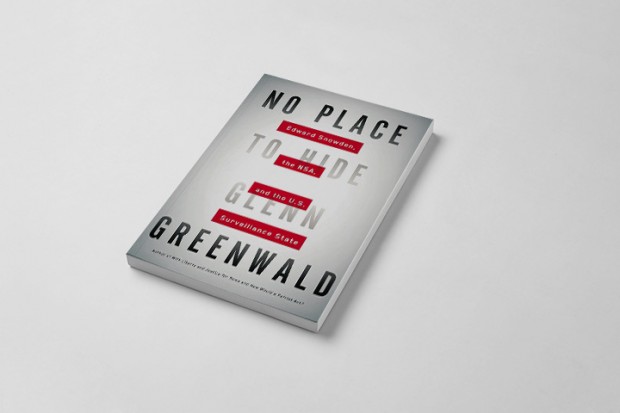
“Unlike the Brits [Luke Harding and Edward Lucas], Greenwald communicated with Edward Snowden; the first time face to face in Hong Kong in May 2013, and the last time only several days ago here in Moscow. And it was he who was chosen by Snowden for publicizing his exposes to The Guardian.
However, despite this important advantage, the main thing in Greenwald’s book is what is not in it.
In Greenwald’s book, the Russian period of Snowden’s life is missing. So is the story of how Snowden got on the flight to Moscow. Snowden’s visit to the Russian consulate in Hong Kong isn’t there, or even the names of the two lawyers who drove Snowden from the hotel after Snowden published his appeal to the world in the Guardian, acknowledging his authorship of the leaks. The name of Sarah Harrison from the WikiLeaks team, who accompanied Snowden to Moscow and spent the entire time with him during his forced stay at Sheremetyevo, is mentioned only once. And in fact Greenwald only mentioned her in the afterword, where he thanks Sarah and WikiLeaks for support.
Soldatov describes the structure of the book — divided into the narrative about Greenwald’s meeting with Snowden; criticisms of other journalists who attacked him (even saying he should be arrested); and the leaked documents. He says the book contains “a mass of curious details,” such as the agreement to meet Snowden the first time by an artificial alligator at the hotel, and that Snowden would be carrying a Rubiks’ cube in his left hand.
“Greenwald is not only honest, but completely confident in the correctness of each step he and Snowden have taken. Several months ago at a journalists’ conference in Rio de Janeiro, I nearly fell out of my chair, along with my colleagues, when Greenwald, in answer to a question from the moderator, about how he verified Snowden’s information, said that he had ‘developed a sixth sense,’ and at the next question, about how he maintained the necessary distance from his source, said he did not know who had conceived of such idiotic rules, and he didn’t intend to observe them.
This confidence in one’s own rectitude possibly explains best of all why in Russia, people don’t talk about the American’s exposes as much as they do in Europe and in South America.”
Soldatov then picks out an important contradiction in Snowden’s behaviour — he notes how in his book, Greenwald was shocked how open Snowden was, using his own name to register in the hotel, using a credit card in his real name, etc. because “he wanted to forestall any attempt to accuse him that he was some kind of recruited agent, which would be easier to do, if he spent that period in hiding.”
“Snowden told Greenwald that from the very beginning, he wanted to demonstrate that his actions could be verified from the outside and there was no conspiracy here, and he acted alone.
However, Snowden kept to that tactic, as is known, only in Hong Kong, and only before his meeting with Poitras and Greenwald.
Since Snowden appeared in Moscow, almost a year has passed, and there has been no possibility of learning where he spent all this time, who paid his bills and who chose for him Anatoly Kucherena, a member of the FSB’s Civic Council, as his Russian representative.
Meanwhile, the Russian reader loves conspiracy theories. From the president, who believes the Internet is an invention of the CIA, to an ordinary clerk, savoring the details of the intercepted conversation of Victoria Nuland in Kiev during Maidan, almost everyone believes that behind every sensational political event there must be some state actor and it is best if it is an intelligence agency. The Snowden epic is the best present to conspirology, since it provides a wide scope for the existence of two conspiracy theories in one; first, that the US is behind everything on the Internet, and second, that Snowden exposed everything on orders from the Chinese and Russian intelligence agencies.
These suspicions are only reinforced by the fact that we have a tradition of many years of treating defectors and sleeper agents, from Kim Philby to the SVR illegals caught in the US in 2010. This tradition is built on the fact that the agent is harshly controlled in his contacts and communication. The total impression is created that Edward Snowden, once he got beyond the bounds of the airport, automatically fell into that category. And in the last year, he has done nothing to dispel those suspicions.”
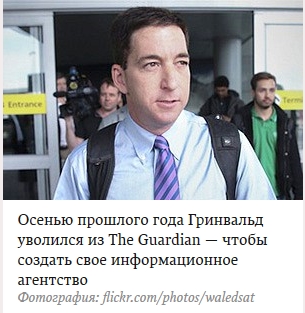
“In the fall of last year Greenwald resigned from the Guardian in order to create his own news agency. Photo by waledsat
Soldatov believes the book will do little to convince Snowden skeptics or believers to change their mind. He notes that Greenwald seems not to have realized that once Snowden’s identity was revealed, it wouldn’t just be him doing the revelations, but other journalists would now treat him as a story as well.
“In fact a good journalist will try to dig for the truth in both cases — investigating the lying of the NSA in the USA, and trying to find explanations for the strangeness of Snowden’s behavior. Evidently in the last year, Greenwald never did understood that, which is why he spends a third of the book on haranguing other journalists. Snowden did not understand this either, when he decided to reply to criticism directed at him by asking Vladimir Putin a question on the air about massive surveillance in Russia, and instead of universal approval, received harsh criticism from practically all sides.
Snowden’s behavior in Russia should be explained, especially taking into account how cleverly his revelations were used by Russian propaganda for justifying all the new repressive laws on the Internet; even one good question about whether Russian authorities are tracking their citizens does not explain anything, and only provides new fodder for conspiracy theorists. Glenn Greenwald’s book does not provide these explanations, either.”
May 28, 2014
1726 GMT: Another Russian non-governmental organizations has failed in its legal challenge of a designation from the prosecutor of “foreign agent,” Human Rights in Russia reports.
On 28 May the Sverdlovsk Regional Court satisfied the prosecutor’s complaint of a previous court decision acknowledging the NGO Legal Basis was unlawfully warned of “foreign agent” status, Agora, the legal defense organization reported. Under a law signed by Putin in 2012, any NGO that receives funding from abroad and engages in unspecified “political activity” must register as a “foreign agent” with the Ministry of Justice or face closure and fines.
Legal Basis was warned of its offending status on 18 April 2013 during a massive country-wide sweep of NGOs, and then issued a prosecutor’s notice of violation of the law on 19 November 2013. The group’s attorney did not contest the receipt of foreign grants, but challenged the concept of “political activity,” citing the prosecutor’s own statement, which acknowledged that the group had not organized or participated in any rallies, demonstrations or pickets, and noting that no such “political” activity was specified.
Meanwhile, the Russian Constitutional Court issued a separate ruling today regarding the Center for Social Policy and Gender Studies, in which the Court affirmed that the concept of political activity in the federal law on non-commercial organizations should be interpreted narrowly and not applied to the ordinary activity of non-profit groups, Human Rights in Russia reported.
Further, the Court said that non-profit scholarly activity, for example, could not be deemed political even if it had as its goal the influencing of decisions made by state bodies. However, it left the door open for continued prosecutions as it added, “under the condition that these purposes do not go beyond the bounds of the relevant field of activity.”
Yet another NGO, the Human Rights Resource Center, was preparing an appeal of the “foreign agent” status to a court in Saratov on the basis of today’s Constitutional Court’s ruling.
1558 GMT: A new defendant in the Bolotnaya Square case, Dmitry Izhevsky, was brought in for questioning, two years after the demonstration, Grani.ru and RosUznik reported. He is to be held in jail until 27 July while under investigation. Both his own and his parents’ apartments were searched by police. His attorney’s efforts to get him released until trial failed, as the judge ruled that he was a flight risk because he had traveled abroad in the past, and also might attempt to influence the trial.
Izhevsky’s wife at first was not allowed in the court room for violating procedures, as she kissed her husband good-bye. She denied that her husband was “hiding” from the prosecution as he had traveled and returned home a number of times and was living in his own apartment.
Izhevsky, 31, had previously served in the army and reached the rank of senior lieutenant. After completing service, he taught in the Cadets’ corps for a time. He was unemployed at the time of his arrest. Although not a member of any political party or movement, he had taken part in rallies “for honest elections” in 2011-2012 and was jailed once for 10 days in an action in March 2012 protesting NTV coverage, but was not detained on 6 May 2012.
Police confiscated the clothing he was said to wear on the day of the march in 2012 and other items “relevant to the investigation” from his apartment. Investigators tried to get Izhevsky to sign a charging statement but he declined. “I am a military officer. I can’t sign such nonsense for any thing. I had better sit it out.”
Human rights activists told hro.org that the Bolotnaya case was reminding them of the “elastic” and “endless” investigations run by the Soviet KGB, such as the long-running case against the Chronicle of Current Events, used to persecute dissidents throughout the country.
The trial of neo-communist Sergei Udaltsov is now in its 45th day. An official observer of the demonstration, Nikolai Svanidze, was called to testify, Udaltsov’s account on Twitter, run by his supporters, reported. Svanidze said that police had created a bottle-neck and a crush of people when they blocked movement themselves on to Bolotnaya Square.
Перерыв до завтра до 11.00. Завтра в Мосгорсуде будут допрошены свидетели защиты Дмитрий Гудков (депутат Госдумы) и Геннадий Гудков
— Сергей Удальцов (@s_udaltsov) May 28, 2014
Translation: @s_udaltsov Break until tomorrow at 11:00. Tomorrow witnesses for the defense Dmitry Gudkov (deputy of the State Duma) and Gennady Gudkov will be questioned at Moscow City Court.
Следствие по Болотному делу продлено до 6 ноября | ОВД-Инфо http://t.co/3HYD6KZIm9
— OvdInfo.Org (@OvdInfo) May 28, 2014
Translation: @OVDinfo Investigation in Bolotnaya case extended until 6 November.
0342 GMT: Despite Western sanctions and the desire of the Russian leadership to strike back, Prime Minister Dmitry Medvedev says he is not going to boycott Apple products, Forbes.ru and Komsomolskaya Pravda reported 21 May.
“‘What does our current frictions with America have to do with the iPhone? Let’s then reject all imported items, and then what will you have? North Korea?'”
Medvedev further said it would be “ridiculous” to think you could harm Americans by boycotting Apple, and no one should reject their products.
While he served as president in 2010, Medvedev received a then-new iPhone 4 from Steve Jobs personally when he visited Silicon Valley. He has since upgraded to iPhone 5, as he reports from his Instagram account.
Recently, Medvedev posted on Instagram an arty shot of the Balaklava Yacht Club in occupied Crimea, which sparked a debate in the comments:
0237 GMT: In an article 24 May on the web site of Ekho Moskvy, Russian economist Sergei Aleksashenko, former Central Bank deputy chairman and Kremlin critic, says “Putin is right” that Western sanctions aren’t hitting Russia very hard. As Putin said at the recent St. Petersburg Economic Forum, “all of this does not have a serious, systemic, negative affect on our economy.”
Three months after sanctions were imposed by Putin’s 18 March forcible annexation of the Crimea following a military campaign, Aleksashenko believes that anti-Kremlin sanctions are nothing like those placed on Iran. The Interpreter has translated excerpts:
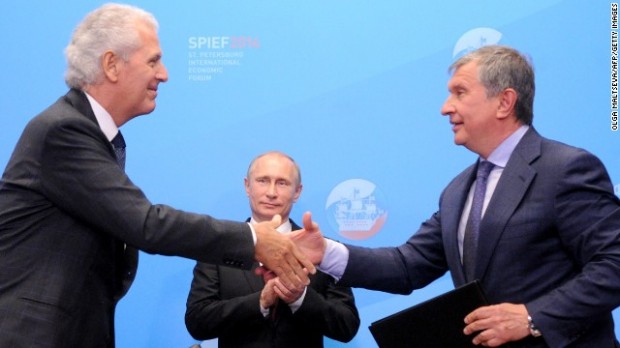
Putin behind Igor Sechin (R), the CEO of Rosneft, and Marco Tronchetti Provera of Italian tire manufacturer Pirelli. Photo by CNN
“As of today, sanctions are introduced against 60 Russian and Crimean politicians and businessmen and several Russian and Crimean companies. Thus the sanctions are pin-pointed and not systemic; that is, their potential effect from the outset cannot be large.”
We could also add that while roughly equivalent, the US and European Union sanctions lists are not perfectly in sync. While Igor Sechin, CEO of Rosneft was recently included in the US sanctions list, he is still able to do business with European corporations. As CNN reports, Pirelli, the Italian tire manufacturer, finalized a deal with Rosneft at the forum.
Sanctions in general don’t always have the desired effect, but in this case, says Aleksashenko, the West’s caution was deliberate:
“The non-systemic nature of the sanctions was a conscious choice of the West which evidently was moved by a desire to do something rather than a desire to achieve something. The companies that fell under the sanctions are not major and not systemically significant for the Russian economy. And that was also a conscious choice of the West.”
Unfortunately, those targeted merely see the sanctions as “the highest state award” — but their immediate relatives who are often living in the West or traveling there, have not had their assets touched. (See, for example, the report by The Interpreter‘s Elena Servettaz about the son of Vladimir Yakunin living the high life abroad.)
In his St. Petersburg speech, Putin used a word from prison jargon — “ukontrapupit’” which roughly translates to “countering” with regard to the West’s attempts to hedge in him and his cronies. Aleksashenko agrees that no such circumscription has occurred because those targeted managed to hide their wealth in time. For example Gennady Timchenko was able to sell his shares in Gunvor to another investor. Neither Gazprombank or SOGAZ, which handle gas and oil money, have been affected.
The only real annoyance is the visa bans, but with the billions in loans some of these oligarchs are able to get from state coffers, the pain is lessened, he says.
Even so, says Aleksashenko, Western sanctions are still a serious psychological blow to the Russian business community and political elite; “they have thought much more about insurance from political risks (i.e. they think about how to get their capital out of Russia); and politicians have hunkered down in their fortresses for “their last and decisive battle” which hardly helps them resolve problems and forces them to “move toward an isolationist model of the economy based on state domination.”
0230 GMT: Reuters has an in-depth investigation of Russian Railways in a series called “Comrade Capitalism”.
“In the world’s biggest country, railways are still a route to riches. With nearly 1 billion passengers a year and $42 billion in annual sales, the state company Russian Railways is a giant commercial opportunity.
At its head is Vladimir Yakunin, an old friend and long-standing ally of President Vladimir Putin. He oversees a company that strikes international deals, issues bonds to major investors and plans hugely expensive new high-speed lines. By many measures, Russian Railways is a standard corporate colossus.
But a Reuters investigation has uncovered another side to the state-owned company: Under Yakunin, it has paid billions of dollars to private contractors that disguise their ultimate owners and have little or no presence at their registered headquarters.”
Reuters documents strange auctions, disappearing contractors, “high-speed transactions,” and myriad connections with bankers.
“Millions of dollars from state-owned Russian Railways appear to have gone to private companies with little sign of doing work on Russia’s rail system,” says Reuters.
Yakunin was included in the US sanctions list for his role in the forcible annexation of Crimea.
As we have reported in the past, Russian Railways has suffered a dramatic loss of profits in the last year; was involved in the corrupt construction contracts of the Sochi Olympics; has been exposed as involved in corrupt self-dealing through its own mobile ticket purchase service, and has been plagued with reports of poor or discontinued service in the provinces, leaving people stranded.
0210 GMT: The Russian Federation Federal Corrections Service (FSIN) has notified the court, investigation, and Prosecutor General’s Office that despite a ban, opposition leader Alexey Navalny is using the Internet while under house arrest, ITAR TASS reports.
The notice comes after extension of Navalny’s house arrest for another 6 months in the case involving charges of embezzlement related to the French company Yves Rocher and complaints by a conservative deputy of the city legislature, Alexei Lisovenko, who successfully sued him for libel last month that he was continuing to use the Internet.
FSIN says that they monitor information related to persons under house arrest, and “if information appears” that they are using the Internet, it is submitted to the court or investigator.
Authorities may then opt to change the terms of Navalny’s pre-trial custody from house arrest to jail.
Navalny maintains that his Twitter account and blog sites are being updated by his wife and colleagues.
“All accounts on social media are being run by the so-called Navalny collective including employees of the Anti-Corruption Foundation and Navalny’s wife, Yuliya,” Anna Veduta, Navalny’s press secretary told ITAR TASS.
May 27, 2014
1400 GMT: Billboards have gone up around Moscow of a painting titled “Possessed,” depicting naked opposition figures in a public campaign against the Russian opposition whose sponsors are not known, Ekho Moskvy reports.
The billboards contain giant reproductions of a painting by an obscure Russian-American artist, Yuri Danich, and depicts figures like anti-corruption blogger Alexey Navalny, video blogger and independent media commentator Valeriya Novodvorskaya, former deputy prime minister Boris Yeltsin, talk-show host Kseniya Sobchak, poet Dmitry Bykov, and neo-communist Sergei Udaltsov, who is now standing trial, as well as other prominent figures who have been critical of the Kremlin.
The painting used in the billboard was first unveiled at a showing in early May that appeared to be timed with expected opposition protests against on-going trials of defendants arrested 6 May 2012 in a large anti-Putin rally on Bolotnaya Square. But it is not known who organized and paid for the reproduction of at least 15 of these giant billboards around Moscow, says Ekho Moskvy.
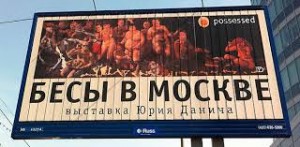
Billboards in Moscow in May 2014 with reproduction of painting “The Possessed,” by Yuri Danich. Photo by Ekho Moskvy.
The title of the painting is taken from the novel by Fyodor Dostoyevsky, The Possessed (or The Devils) and is also supposed to evoke the idea that “the emperor has no clothes”.
Danich told Ekho Moskvy that at first he wanted to capture the concept of “insanity” in the opposition figures, and went to real psychiatric hospitals in Moscow and sketched patients — apparently without any ethical considerations. Then he decided that he would rather reflect in them a “demonic energy” that comes with “self-obsession.”
Ordinary Muscovites interviewed by Ekho Moskvy said that they didn’t care for the Russian opposition, but they found the billboard vulgar and annoying.
The billboard campaign follows attempts by pro-government artists to hang large banners from the House of Books in Moscow with caricatures of the opposition as “alien”, and also other propaganda campaigns by the ruling United Russia, which caricatured Navalny and others as clowns on the cover of a 2012 calendar.
Posters against Russian opposition figures as “Western-sponsored” or “fifth columnists” were also featured in the pro-government referendum campaign in the Crimea in March. Here’s a “wall of shame” kiosk at the train station in Simferopol snapped by a Ukrainian TV station still visible in April:
The Russian opposition figures included on the posters are Alexey Navalny, Boris Nemtsov, Mikhail Kasyanov, Ilya Ponomarev, Andrei Makarevich, Natalya Sindeyeva, Vladimir Ryzhkov, Gennady Gudkov, Dmitry Gudkov, and Pussy Riot’s Nadezhda Tolokonnikova and Mariya Alyokhina.
